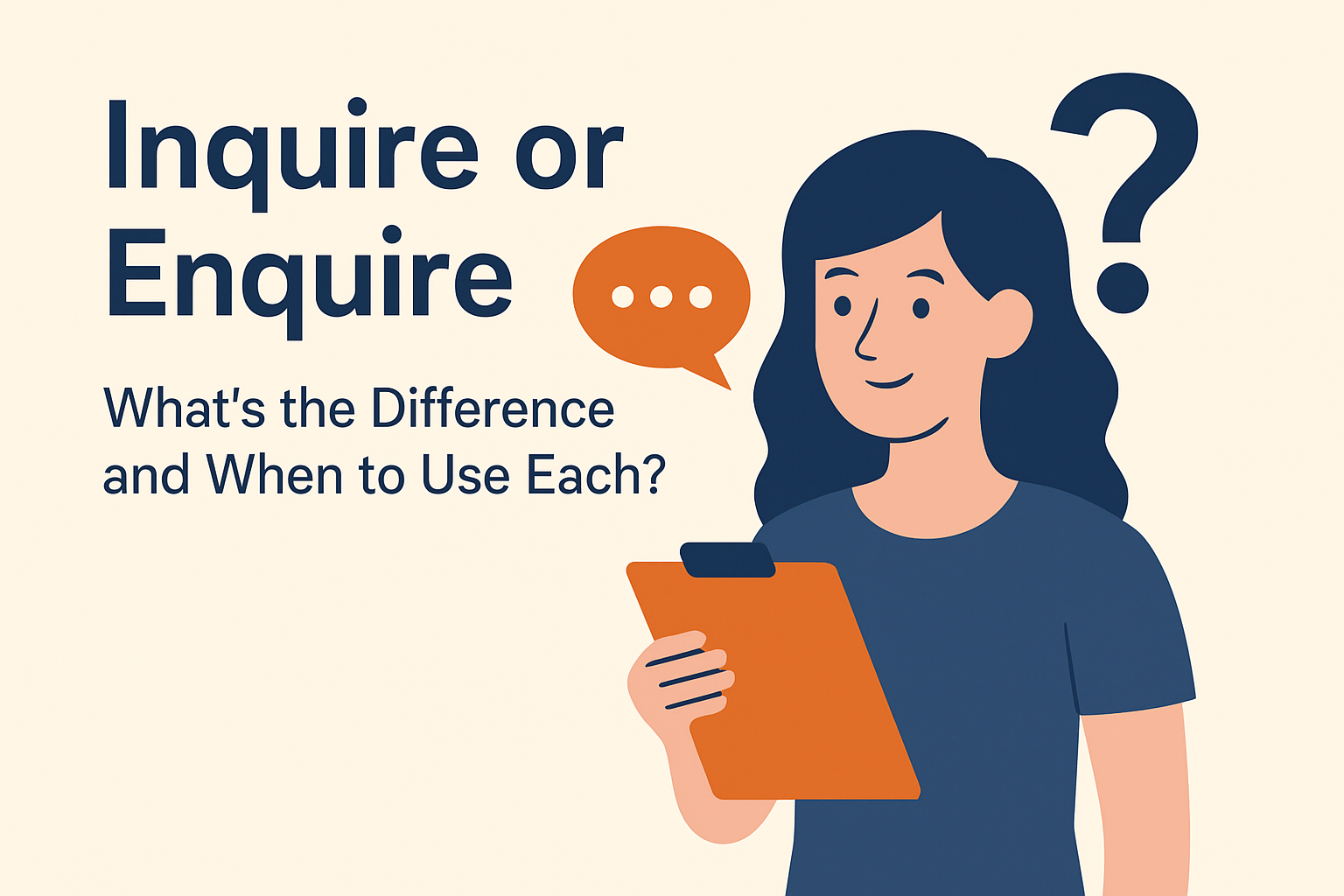Do You Inquire or Enquire?

Do you inquire or enquire about a product? What about when asking about a person, a place, or a situation? The question of whether to use inquire or enquire often causes hesitation among many good writers.
Both words mean “to ask” or “to seek information”, but the correct spelling depends on where you are writing and sometimes what you are asking about.
Furthermore, writers also wonder about their other forms, such as inquiry vs enquiry and inquiring vs enquiring. This guide breaks down these differences and helps you stay consistent: whether you are asking about a product, a person, or a place
So, is it enquire or inquire? The short answer:
- Inquire and inquiry are preferred in American English.
- Enquire and enquiry are more common in British English, though inquire is also widely accepted in formal contexts in the UK.
Related post: Cancelled vs Canceled: Which Spelling Is Correct?
Explore more: See other commonly confused word pairs
Grammatical Explanation: Inquire or Enquire?
The difference between inquire and enquire is mainly a matter of regional spelling preference, although some style guides make slight distinctions between formal investigation and simple asking.
| Word | Region / Context | Meaning | Example |
|---|---|---|---|
| Inquire | American English (preferred), also formal British English | To ask, to investigate | I would like to inquire about the job opening. |
| Enquire | British English (common in informal writing) | To ask (general questions) | She enquired about the next train departure. |
Noun Forms: Inquiry vs Enquiry
The same rule applies to the noun forms:
| Word | Region / Context | Meaning | Example |
|---|---|---|---|
| Inquiry | American English (preferred), also formal British English | A formal investigation or serious question | The committee launched an official inquiry. |
| Enquiry | British English (general asking) | A general question | I made an enquiry about the ticket prices. |
Examples of Inquire or Enquire in Real-Life Sentences
Correct Usage of Inquire:
- I would like to inquire about your return policy.
- The lawyer is inquiring about the evidence presented in the case.
Correct Usage of Enquire:
- She enquired whether the store had any discounts.
- They are enquiring about available hotel rooms.
Inquiry vs Enquiry Examples:
- Inquiry: The government launched a formal inquiry into the matter.
- Enquiry: We received several enquiries about the upcoming workshop.
Common Mistakes with Inquire or Enquire
The most common mistake is mixing up the spellings within the same document or choosing the wrong form for the audience.
Key Mistakes to Avoid:
| Mistake | Why It Happens | Correct Form |
|---|---|---|
| Using enquire in American English writing | British spelling preference carried into US writing | Should be inquire |
| Choosing inquiry for informal questions in the UK | Inquiry is generally used for formal investigations | Use enquiry for casual asking |
| Mixing inquiring and enquiring inconsistently | Forgetting the regional spelling rule | Stick to one style throughout |
Always check your region’s style guide or your audience’s expectations for consistency.
Memory Tips to Remember Inquire or Enquire
Here are some simple ways to remember the difference:
- Inquire = Investigate. Both start with “in”: Think in-depth investigation (formal).
- Enquire = Everyday asking. The “e” can remind you of everyday enquiries (informal).
Tip: In the US, always use inquire and inquiry. In the UK, enquire for asking, inquire for formal investigations, unless your style guide says otherwise.
Conclusion
The choice between inquire or enquire, as well as inquiring vs enquiring and inquiry vs enquiry, comes down to region and tone:
- Use inquire and inquiry for American English and for formal investigations.
- Use enquire and enquiry for general asking in British English.
By understanding these distinctions, you can avoid one of the most common spelling mistakes in English and keep your writing consistent and professional.